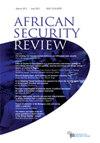Policing COVID-19 restrictive regulations in Zimbabwe: The shifting crime trends and the human rights implications
IF 1.1
Q3 INTERNATIONAL RELATIONS
引用次数: 4
Abstract
ABSTRACT The emergence of the COVID-19 pandemic brought about a myriad of responses on the global, regional and national levels. One of the widely adopted measures of dealing with the scourge was the crafting of stringent regulatory frameworks to curtail the spreading of the virus through restriction of citizens’ movement. The role of the police services and, importantly, the military, came under spotlight, as they were instrumental in enforcing COVID-19 containment-related laws. The confinement of people to their homes, as well as the enforcement of the restrictive regulations, led to a paradigm shift in the crime trends. More often, the police and the military had to contend with allegations of various criminal activities and human rights violations. In this paper, which was based on a documentary survey, we discuss the policing environment during the COVID-19 era. We focus on how the COVID-19 era has altered the criminal environment, focusing on criminal activities by both the public and the law enforcement agents. We also explore the human rights implications of the enforcement of COVID-19 containment regulations.津巴布韦监管新冠肺炎限制性法规:不断变化的犯罪趋势和对人权的影响
摘要新冠肺炎大流行的出现在全球、区域和国家层面带来了各种应对措施。应对这一祸害的广泛措施之一是制定严格的监管框架,通过限制公民行动来遏制病毒的传播。警察部门,重要的是军队的作用受到了关注,因为他们在执行新冠肺炎控制相关法律方面发挥了重要作用。人们被限制在家中,以及限制性法规的实施,导致了犯罪趋势的范式转变。更常见的情况是,警察和军队不得不面对各种犯罪活动和侵犯人权的指控。在这篇基于文献调查的论文中,我们讨论了新冠肺炎时代的警务环境。我们关注新冠肺炎时代如何改变犯罪环境,重点关注公众和执法人员的犯罪活动。我们还探讨了执行新冠肺炎控制条例对人权的影响。
本文章由计算机程序翻译,如有差异,请以英文原文为准。
求助全文
约1分钟内获得全文
求助全文

 求助内容:
求助内容: 应助结果提醒方式:
应助结果提醒方式:


